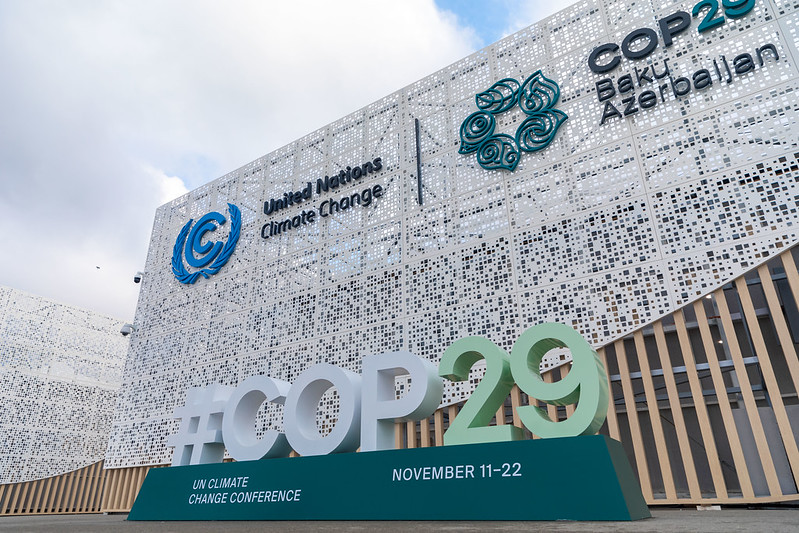This Blog is part of a series on COP29. The Conference of the Parties (COP) has become the focal point for global climate action, despite ongoing debates and skepticism. In this three-part series, we’ll examine COP29, focusing on climate diplomacy, finance, and the energy sector.
A blog by Hannah Dietz.
29 years of opportunity and omission
29 years ago, at the first Conference of Parties (COP) in Berlin, 116 countries made a joint commitment to limit and reduce greenhouse gas emissions beyond the year 2000. Today, at COP29, the political agenda is still very much present, and the official website speaks of the “moral duty to avoid overshooting the 1.5°C temperature target”. Yet, 29 years of COPs have not led to the desired goal of reducing greenhouse gas emissions. On the contrary: according to Copernicus, the EU’s earth observation programme, the global average temperature already reached or exceeded 1.5 °C above pre-industrial levels every month between July 2023 and June 2024.
COPs are often criticised for being ineffective and having become far too large, so that they no longer fulfil their purpose. Latest criticism comes from prominent figures such as former UN Secretary-General Ban-Ki Moon, former UN climate chief Christiana Figueres and former Irish President Mary Robinson. Beyond verbal criticism from individuals, there is also criticism from participating countries such as Papua New Guinea, which did not take part in COP29 as a result. According to Prime Minister James Marape, the major emitters are not providing rapid assistance to countries that are victims of climate change. In contrast, countries such as Papua New Guinea with a large proportion of forest and sea would contribute to a cleaner climate but would not receive any compensation payments in return.

The need for continuous dialogue
Even if this criticism is justified, reducing the size of the format would most likely mean that many voices would no longer be heard. After all, the COP brings together polluter states with the most severely affected by climate change but least responsible countries. For instance, the German Minister of Economic Affairs, Robert Habeck, held a speech at the German industry evening at the COP, in which he highlighted Germany’s responsibility for climate change, emphasizing the need for global cooperation as its worst effects hit countries less responsible for emissions.
Amid global challenges like Russia’s war in Ukraine, tensions in the Middle East, Trump’s re-election, and the Covid aftermath, climate change must remain a priority and be addressed as a global, not national, challenge. At COP29, lengthy negotiations on the important topics of energy and climate financing were held again. The fact that the heads of state and government or important representatives from industrialised countries, above all the EU, were absent, was a further aggravating factor. Neither von der Leyen, who made climate protection a priority for the EU with the EU Green Deal, nor Macron or Scholz were present at this year’s COP29.
The future of climate diplomacy
The rise of climate-skeptical right-wing leaders in Europe and the U.S. dampens hopes for higher climate funding. Yet, overlaps with right-wing priorities, such as economic growth, exist, which can be promoted through green technology investments. At COP29 in Baku, Hungarian prime minister Orbán highlighted Hungary’s push in EV technology, while Italy’s prime minister Meloni allocated over € 4 billion for climate action in Africa to curb migration, showing that right-wing parties, despite questionable motives, are not entirely halting climate efforts. The Taliban delegation’s participation in COP29 for the first time also speaks in favour of this. Afghanistan is suffering greatly from the consequences of climate change.However, it is also true that countries such as Argentina have withdrawn their delegates from COP29, and the prospect of Trump once again wanting to withdraw from the Paris Climate Agreement is not a good harbinger for climate action. China’s role will be important for the upcoming COPs, not only because China is the largest emitter of greenhouse gases, but also because China could assume a central role following a possible U.S. withdrawal from the Paris Agreement. Simon Stiell, Executive Secretary of the UN Climate Change Secretariat, even goes as far as to call for China to take a leading position at the upcoming COPs. Ultimately, it remains both necessary and vital for as many nations as possible to come together and engage in dialogue to make collective decisions on one of the most significant global challenges facing world politics – because climate change has no political positions.
Hannah Dietz is a Master’s student on the joint Master’s programme in International Relations at Freie Universität Berlin, Humboldt-Universität zu Berlin and the University of Potsdam. She obtained her Bachelor’s degree in Political Science and German Studies at Goethe University in Frankfurt. She is Co-Lead of the Climate and Energy Program of Polis 180.
Editing by Eva Hager and Merritt Fedzin.
Image via Flickr
The Polis Blog serves as a platform at the disposal of ‘Polis180’s & ‘OpenTTN‘s members. Published comments express solely the ‘authors’ opinions and shall not be confounded with the opinions of the editors or of Polis180.
Zurück